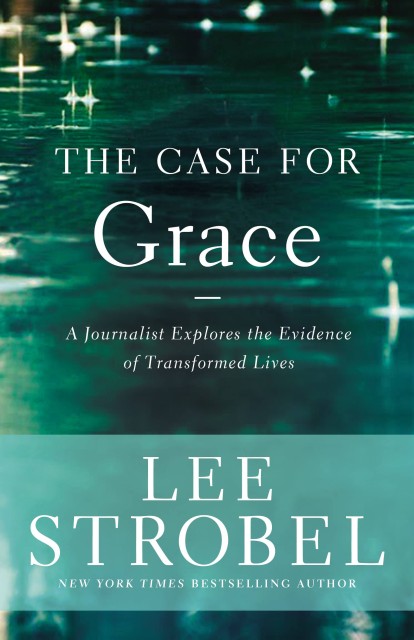Grand Rapids, MI — Two findings emerged in a new national poll on fatherhood and faith: the younger the generation, the more people report having difficult relationships with their fathers. At the same time, the younger generation reports the highest percentage of people who are struggling with belief in God. Atheist-turned-Christian Lee Strobel, who commissioned the survey, is raising the provocative question of whether these findings might be related.
“The poll itself can’t prove or disprove a direct correlation between those findings,” Strobel said. “Certainly, there are a lot of factors that influence a person’s belief in God. But in my case — and in many others I’ve seen through the years — a person’s relationship with their earthly father seems to influence whether they’ll be receptive to a heavenly Father.”
The poll* was conducted by the Barna Group in conjunction with Strobel’s new book, The Case for Grace (Zondervan, Feb. 24, 2015), in which themes of faith and fatherhood are intertwined. In this new book, Strobel describes his own rocky relationship with his dad, which was one of the factors that moved him toward spiritual skepticism. He was an atheist for much of his life, until a nearly two-year investigation of the evidence for Christianity prompted him to become a Christian in 1981.The former award-winning legal editor of the Chicago Tribune is now a Professor of Christian Thought at Houston Baptist University and the New York Times best-selling author of more than twenty books on Christianity.
Among the findings of the poll:
- The younger the responders, the more likely they were to report difficulties in relationships with their fathers. Among the Elder generation (ages 69 and up), 15 percent said they had a poor or below average relationship with their dad while growing up. For Baby Boomers (ages 50-68), the number was 17 percent; for Gen X (ages 31-49), it was 22 percent. And for Millennials (ages 18-30), the number grew to 26 percent — or one in four.
- More than one-third of Millennials are struggling with belief in God, compared with one-quarter of Gen X and one-fifth of Baby Boomers and Elders. Put another way, 62 percent of Millennials are certain God exists, compared with 74 percent of Gen X, 82 percent of Boomers, and 79 percent of Elders.
“So two findings can be identified,” Strobel said. “First, a higher percentage of Millennials report having subpar relationships with their fathers than do older generations. And second, a higher percentage of Millennials are uncertain or doubtful that God exists, compared to older responders. While this particular survey can’t establish for sure whether there’s a correlation, I think these findings are definitely worth further exploration.”
Strobel also highlights related findings from other researchers:
- In his book Faith of the Fatherless: The Psychology of Atheism, psychologist Paul Vitz of New York University showed that many well-known atheists through history — including Friedrich Nietzsche, David Hume, Bertrand Russell, Jean-Paul Sartre, Albert Camus, Arthur Schopenhauser, Ludwig Feuerbach, Baron D’Holbach, Volatire, H.G. Wells, and Madalyn Murray O’Hair — felt abandoned or deeply disappointed with their fathers. “That a child’s psychological representation of his father is intimately connected to his understanding of God was assumed by Freud and has been rather well developed by a number of psychologists, especially psychoanalysts,” said Vitz. “In other words, an atheist’s disappointment in and resentment of his own father unconsciously justifies his rejection of God.”
- In the 2014 book Families and Faith: How Religion Is Passed Down Across Generations, Vern L. Bengtson and his coauthors found that for religious transmission through generations, “fervent faith cannot compensate for a distant dad.” He found that “a father who is an exemplar, a pillar of the church, but doesn’t provide warmth and affirmation to his kid does not have kids who follow him in his faith.”
Said Strobel: “Certainly, there are skeptics who had great relationships with their dads, and many Christians have had poor relationships. Still, for some people — and I would include myself — it’s a factor in their spiritual development. If someone’s earthly father has hurt or disappointed them, it makes sense they might shy away from seeking a heavenly Father, who could let them down even more.”
The Case for Grace recounts stories of a wide range of people radically transformed through a relationship with God. Publishers Weekly called the book “eloquent and honest.” Zondervan releases Children’s and Student editions alongside the hardcover trade book on February 24.
* Poll included 1,001 telephone interviews conducted among a representative, nationwide sample of adults ages 18 and older. The interviews were conducted from August 25 through September 10, 2014. The sampling error is plus or minus 3.1 percentage points at the 95 percent confidence level. The cooperation rate was 78 percent.
Lee Strobel is the former award-winning legal editor of The Chicago Tribune and a New York Times best-selling author of more than twenty books. He currently serves as Professor of Christian Thought at Houston Baptist University and a teaching pastor at Woodlands Church, one of the country’s largest congregations. Described in the Washington Post as “one of the evangelical community’s most popular apologists,” Lee has been interviewed on such national TV networks as ABC, Fox, PBS and CNN, and his articles have appeared in a variety of periodicals, including the online editions of the Wall Street Journal and Newsweek. He has been a recurring guest on The Bible Answer Man and Focus on the Family radio programs. He is a member of the Evangelical Philosophical Society. More information can be found at www.LeeStrobel.com.





